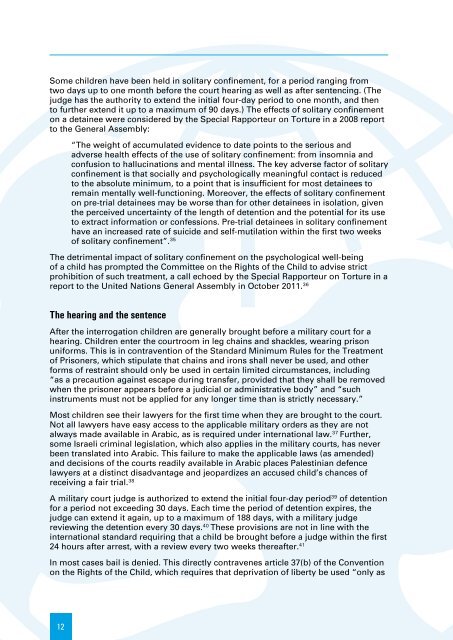Children in israeli Military detention
Children in israeli Military detention
Children in israeli Military detention
You also want an ePaper? Increase the reach of your titles
YUMPU automatically turns print PDFs into web optimized ePapers that Google loves.
Some children have been held <strong>in</strong> solitary conf<strong>in</strong>ement, for a period rang<strong>in</strong>g from<br />
two days up to one month before the court hear<strong>in</strong>g as well as after sentenc<strong>in</strong>g. (The<br />
judge has the authority to extend the <strong>in</strong>itial four-day period to one month, and then<br />
to further extend it up to a maximum of 90 days.) The effects of solitary conf<strong>in</strong>ement<br />
on a deta<strong>in</strong>ee were considered by the Special Rapporteur on Torture <strong>in</strong> a 2008 report<br />
to the General Assembly:<br />
12<br />
“The weight of accumulated evidence to date po<strong>in</strong>ts to the serious and<br />
adverse health effects of the use of solitary conf<strong>in</strong>ement: from <strong>in</strong>somnia and<br />
confusion to halluc<strong>in</strong>ations and mental illness. The key adverse factor of solitary<br />
conf<strong>in</strong>ement is that socially and psychologically mean<strong>in</strong>gful contact is reduced<br />
to the absolute m<strong>in</strong>imum, to a po<strong>in</strong>t that is <strong>in</strong>sufficient for most deta<strong>in</strong>ees to<br />
rema<strong>in</strong> mentally well-function<strong>in</strong>g. Moreover, the effects of solitary conf<strong>in</strong>ement<br />
on pre-trial deta<strong>in</strong>ees may be worse than for other deta<strong>in</strong>ees <strong>in</strong> isolation, given<br />
the perceived uncerta<strong>in</strong>ty of the length of <strong>detention</strong> and the potential for its use<br />
to extract <strong>in</strong>formation or confessions. Pre-trial deta<strong>in</strong>ees <strong>in</strong> solitary conf<strong>in</strong>ement<br />
have an <strong>in</strong>creased rate of suicide and self-mutilation with<strong>in</strong> the first two weeks<br />
of solitary conf<strong>in</strong>ement”. 35<br />
The detrimental impact of solitary conf<strong>in</strong>ement on the psychological well-be<strong>in</strong>g<br />
of a child has prompted the Committee on the Rights of the Child to advise strict<br />
prohibition of such treatment, a call echoed by the Special Rapporteur on Torture <strong>in</strong> a<br />
report to the United Nations General Assembly <strong>in</strong> October 2011. 36<br />
the hear<strong>in</strong>g and the sentence<br />
After the <strong>in</strong>terrogation children are generally brought before a military court for a<br />
hear<strong>in</strong>g. <strong>Children</strong> enter the courtroom <strong>in</strong> leg cha<strong>in</strong>s and shackles, wear<strong>in</strong>g prison<br />
uniforms. This is <strong>in</strong> contravention of the Standard M<strong>in</strong>imum Rules for the Treatment<br />
of Prisoners, which stipulate that cha<strong>in</strong>s and irons shall never be used, and other<br />
forms of restra<strong>in</strong>t should only be used <strong>in</strong> certa<strong>in</strong> limited circumstances, <strong>in</strong>clud<strong>in</strong>g<br />
“as a precaution aga<strong>in</strong>st escape dur<strong>in</strong>g transfer, provided that they shall be removed<br />
when the prisoner appears before a judicial or adm<strong>in</strong>istrative body” and “such<br />
<strong>in</strong>struments must not be applied for any longer time than is strictly necessary.”<br />
Most children see their lawyers for the first time when they are brought to the court.<br />
Not all lawyers have easy access to the applicable military orders as they are not<br />
always made available <strong>in</strong> Arabic, as is required under <strong>in</strong>ternational law. 37 Further,<br />
some Israeli crim<strong>in</strong>al legislation, which also applies <strong>in</strong> the military courts, has never<br />
been translated <strong>in</strong>to Arabic. This failure to make the applicable laws (as amended)<br />
and decisions of the courts readily available <strong>in</strong> Arabic places Palest<strong>in</strong>ian defence<br />
lawyers at a dist<strong>in</strong>ct disadvantage and jeopardizes an accused child’s chances of<br />
receiv<strong>in</strong>g a fair trial. 38<br />
A military court judge is authorized to extend the <strong>in</strong>itial four-day period 39 of <strong>detention</strong><br />
for a period not exceed<strong>in</strong>g 30 days. Each time the period of <strong>detention</strong> expires, the<br />
judge can extend it aga<strong>in</strong>, up to a maximum of 188 days, with a military judge<br />
review<strong>in</strong>g the <strong>detention</strong> every 30 days. 40 These provisions are not <strong>in</strong> l<strong>in</strong>e with the<br />
<strong>in</strong>ternational standard requir<strong>in</strong>g that a child be brought before a judge with<strong>in</strong> the first<br />
24 hours after arrest, with a review every two weeks thereafter. 41<br />
In most cases bail is denied. This directly contravenes article 37(b) of the Convention<br />
on the Rights of the Child, which requires that deprivation of liberty be used “only as


